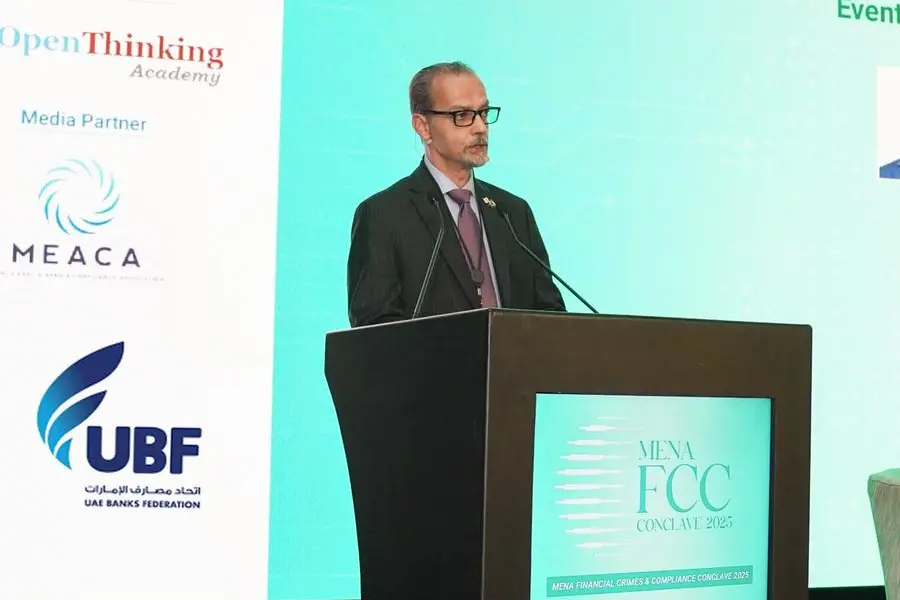By Staff Reporter
ABU DHABI, 20th October, 2025 (WAM) — UAE Banks Federation (UBF) has reaffirmed the importance of compliance with all laws and regulations governing the banking and financial sector, emphasising that it is a key to the banking industry and sustainable development.
The Federation stressed the critical role of adhering to legal and regulatory frameworks to support stability and growth of the UAE’s financial and banking sector, under the direct supervision of the Central Bank of the United Arab Emirates (CBUAE), and to play its role in achieving the country’s sustainable economic and social development goals.
In his opening keynote address at the MENA Financial Crimes and Compliance Conclave 2025, Jamal Saleh, Director-General of UBF, said, “Compliance is not just about adhering to laws – It’s about fostering a culture of integrity and accountability. We are all working within the frameworks to combat financial crimes and ensure compliance with local and international regulations, as well as the frameworks established by CBUAE, to reinforce the leading position of our banking and financial sector.”
He added, “The financial and banking industry is built on trust, and we are committed to transparency, governance, and strict compliance with regulatory frameworks to ensure a safe and seamless banking experience. Our initiatives have helped maintain the banking sector’s leading position as the most trusted sector in the UAE, and placing the country among the top globally in terms of customer trust and confidence in the banking industry.”
Saleh urged participants to continue developing systems, programmes, and solutions to enhance the protection of the financial and digital infrastructure. He highlighted that the rapid evolution of financial crimes, which increasingly exploit technology and cross-border networks, calls for stronger collaboration between banks, regulators, law enforcement, and international partners.
He emphasised the importance of information and expertise sharing to detect and combat illicit activities and protect economies and societies.
He added, “The efforts and initiatives of CBUAE reflect our commitment to international standards and our dedication to establishing the UAE as a trusted and transparent financial hub. At UBF, we support these national efforts through awareness campaigns, capacity-building programmes, and collaborative initiatives that strengthen the readiness of our member banks.
Our efforts also enhance cybersecurity, promote the adoption of advanced technologies, and develop solutions to combat fraud and financial crimes, ensuring compliance with both national and international laws and regulations.”
Saleh explained that the National Fraud Awareness Campaign has played a crucial role in raising public awareness about fraud schemes and helping customers, the community, and the economy by ensuring a safe financial ecosystem since its launch in 2020. He also highlighted the Federation’s focus on bolstering cybersecurity and upgrading digital infrastructure protection.
“We organise annual initiatives such as Cyber Wargaming to strengthen the banking sector’s digital resilience and provide a secure, seamless experience for all customers,” he said.
The UAE has made significant progress in detecting and preventing fraud, implementing several initiatives and measures, including the use of advanced technologies such as artificial intelligence, machine learning, and biometrics, to enhance fraud detection capabilities.
UBF has also established a shared fraud monitoring and information exchange platform to enable banks to collaborate and share data on fraudulent activities and emerging patterns, helping detect and prevent financial crimes more effectively.
The MENA Financial Crimes and Compliance Conclave 2025 brought together a distinguished group of government officials, business leaders, and representatives from the banking and financial sectors, as well as fintech experts.
The summit featured panel discussions addressing the key challenges facing the industry amid rapid technological advancements and evolving regulatory frameworks. Topics included the future of financial crime prevention, the major risks confronting the financial and banking sector, strategic steps to mitigate these risks, and how to leverage artificial intelligence to enhance decision-making. Specialised presentations also addressed trade-based money laundering in local and international channels and strategies for its prevention.


